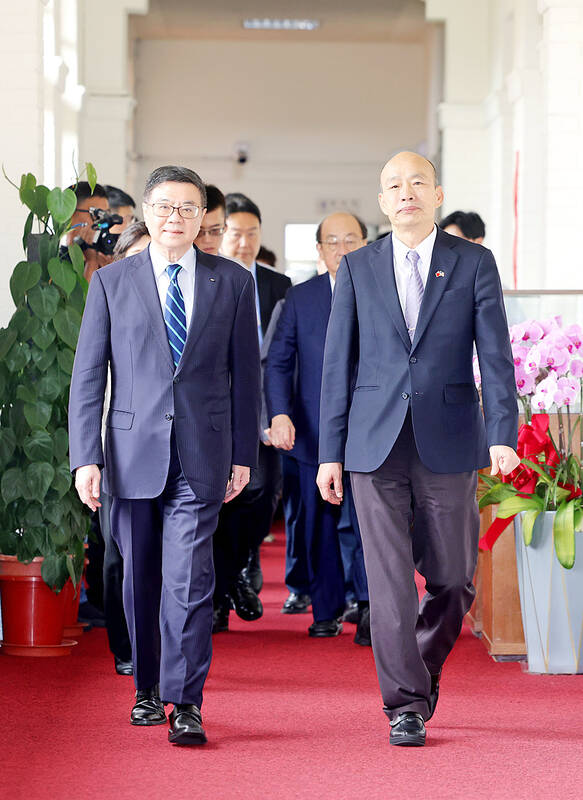Premier Cho Jung-tai (卓榮泰) yesterday reiterated his promise to return a set of controversial reform bills to the Legislative Yuan for reconsideration, saying that the Cabinet is constitutionally obligated to do so if the new laws would be hard to enact.
Under Article 3 of the Additional Articles of the Constitution, the Cabinet can return a bill to the legislature for reconsideration within 10 days of its submission if it deems it difficult to execute.
If more than half of the total number of lawmakers uphold the original bill, the Cabinet must accept it. If they cannot reach a resolution within 15 days after the session begins, the bill becomes invalid.

Photo: CNA
Under the Act Governing the Legislative Yuan’s Power (立法院職權行使法), the legislature can also invite the premier to attend the review to explain the Cabinet’s reasoning.
Speaking to the Democratic Progressive Party (DPP) caucus yesterday, Cho reiterated plans to return the bills that were approved by the legislature on Tuesday.
Once the Cabinet receives the bills and determines that they are difficult to execute, it is its responsibility to return them to the legislature as mandated in the Constitution, he said.
He also voiced support for the caucus’ plan to file for a constitutional interpretation.
Writing on Facebook late on Tuesday, Cho decried the amendments, saying they infringe on constitutionally defined rights, separation of powers and the principle of legal certainty.
“The precious thing about democracy is that consensus is built through discussion and communication,” he wrote.
By sending the set of bills back, the Cabinet does not intend to exacerbate conflict, but to give the legislature another chance to scrutinize and perfect the bills, and to respond to public concerns, he said.
If the Cabinet formally returns the bills for reconsideration, it would be the 14th time in the nation’s history it has done so.
Since 2000, the Cabinet has sent six bills back to the legislature. Four were during former president Chen Shui-bian’s (陳水扁) tenure, and three of them failed to pass.
Of the two returned during former president Ma Ying-jeou’s (馬英九) tenure, both passed, while no bills were returned under former president Tsai Ing-wen (蔡英文).
President William Lai (賴清德), speaking in his capacity as DPP chairman, said that the party respects and supports decisions by the Cabinet to return the bills and the party caucus to file for a constitutional interpretation.
Meanwhile, DPP spokesman Justin Wu (吳崢) said that Lai had previously said he would be willing to give a state of the nation address at the legislature — as required in one of the reform bills — if it was conducted in a legal and constitutional manner.
Additional reporting by Chen Yun and CNA

MAKING WAVES: China’s maritime militia could become a nontraditional threat in war, clogging up shipping lanes to prevent US or Japanese intervention, a report said About 1,900 Chinese ships flying flags of convenience and fishing vessels that participated in China’s military exercises around Taiwan last month and in January last year have been listed for monitoring, Coast Guard Administration (CGA) Deputy Director-General Hsieh Ching-chin (謝慶欽) said yesterday. Following amendments to the Commercial Port Act (商港法) and the Law of Ships (船舶法) last month, the CGA can designate possible berthing areas or deny ports of call for vessels suspected of loitering around areas where undersea cables can be accessed, Oceans Affairs Council Minister Kuan Bi-ling (管碧玲) said. The list of suspected ships, originally 300, had risen to about

DAREDEVIL: Honnold said it had always been a dream of his to climb Taipei 101, while a Netflix producer said the skyscraper was ‘a real icon of this country’ US climber Alex Honnold yesterday took on Taiwan’s tallest building, becoming the first person to scale Taipei 101 without a rope, harness or safety net. Hundreds of spectators gathered at the base of the 101-story skyscraper to watch Honnold, 40, embark on his daredevil feat, which was also broadcast live on Netflix. Dressed in a red T-shirt and yellow custom-made climbing shoes, Honnold swiftly moved up the southeast face of the glass and steel building. At one point, he stepped onto a platform midway up to wave down at fans and onlookers who were taking photos. People watching from inside

Japan’s strategic alliance with the US would collapse if Tokyo were to turn away from a conflict in Taiwan, Japanese Prime Minister Sanae Takaichi said yesterday, but distanced herself from previous comments that suggested a possible military response in such an event. Takaichi expressed her latest views on a nationally broadcast TV program late on Monday, where an opposition party leader criticized her for igniting tensions with China with the earlier remarks. Ties between Japan and China have sunk to the worst level in years after Takaichi said in November that a hypothetical Chinese attack on Taiwan could bring about a Japanese

The WHO ignored early COVID-19 warnings from Taiwan, US Deputy Secretary of Health and Human Services Jim O’Neill said on Friday, as part of justification for Washington withdrawing from the global health body. US Secretary of State Marco Rubio on Thursday said that the US was pulling out of the UN agency, as it failed to fulfill its responsibilities during the COVID-19 pandemic. The WHO “ignored early COVID warnings from Taiwan in 2019 by pretending Taiwan did not exist, O’Neill wrote on X on Friday, Taiwan time. “It ignored rigorous science and promoted lockdowns.” The US will “continue international coordination on infectious